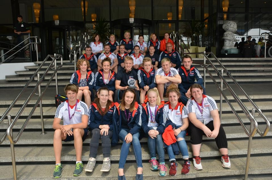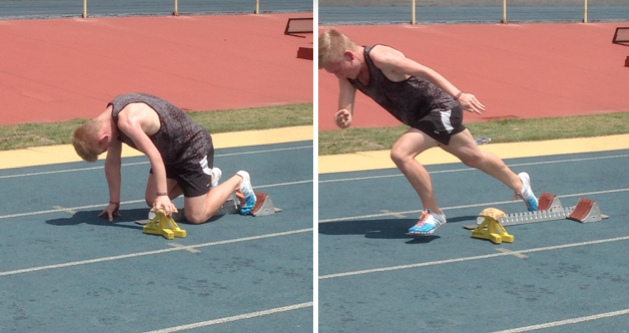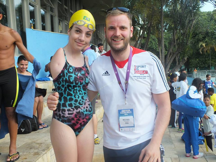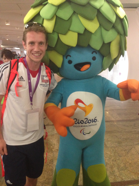Sport and Exercise Medicine: The UK trainee perspective (A BJSM blog series)
By Dr Guy Evans

Fortunately, I was invited as team doctor for the Great Britain (GB) Paralympic team at the 2014 Paralympic School Games in Brazil. Although I have travelled to a number of international championships with the GB rowing team, this was my first experience with Paralympic sport, and it was wonderful. There were plenty of lessons learned both medically and personally – perfect for sharing on the BJSM blog!
Pre-travel preparation
As a first task prior to travel, I collected staff and athlete pre-trip medical information to ensure vaccinations were appropriate and to learn more about the athletes disabilities and medications. I am quite used to receiving pre-participation forms from able-bodied (AB) athletes, which typically consist of the occasional medication alongside a usually modest past medical history (clearly there are some exemptions to this rule!). However, I quickly realised that the medical complexity of the Parasport athletes provided a much higher medical challenge than their AB counterparts. The mixture of medical problems included: visual impairment, learning difficulties, Erb’s palsy and congenital abnormalities. There were also significant medication lists, some of which were on the WADA anti-doping prohibited list. As a consequence, I quickly clarified with the organising committee whether there would be anti-doping tests taking place at the Games and if so whether prospective Therapeutic Use Exemption (TUE) forms were required for such medications. I was assured that anti-doping officials would be present to provide information rather than in a testing role. I also had to ensure that athletes had prescription lists and doctor letters on their person during travel should they be questioned during airport security. One of the squad was taking an opiate-based medication, requiring further inquiries with Brazilian authorities to ensure that these medications would be allowed through customs. Once this was all complete and appropriate immunisations were up to date, we set off for Brazil on the 23nd November!
Environmental and procedural challenges at the games
On arrival in São Paulo, the heat was one of the first challenges the athletes faced (alongside the language barrier and the local traffic). The temperature consistently rose from around 20 degrees Celsius to 30+ Celsius during the hottest parts of the day. Sun cream application was crucial to prevent burning and required constant input from staff and medical team to help those athletes who were unable to apply cream sufficiently due to their disability. By the end of the trip, it was second nature for athletes to work together to get those hard to reach areas, and this genuinely helped the athletes bond!
My first challenge on arrival at the venue in São Paulo was unanticipated. I had to complete a medical declaration for each athlete, signed by myself along with my GMC number. After submitting the forms, I surprisingly heard that the organising committee required proof that I was in fact a REAL doctor, much to the amusement of the two GB physiotherapists! It turns out that in Brazil every REAL doctor has a ‘stamp’ which they use on official documents and that my GMC number accompanied by a screenshot of the GMC website demonstrating my current registration was no match for an official stamp! After much negotiation and providing numerous supporting documents, they eventually believed me and accredited all of the athletes….phew!
On the ground preparation for competition
The first two days of the trip included training and acclimatisation. Competition started on day three and four. This gave the athletes time to see the venues (swimming and athletics) and to adjust after the 12-hour flight. Unfortunately on day 2, an athlete who displayed symptoms of a viral gastroenteritis awoke me in the middle of the night. We effectively isolated him in a separate room and contained the outbreak without any further spread. However, the athlete was unable to compete on the first day of competition. Fortunately, he recovered well to win a silver medal later in the competition!

The athletes (aged 14-17yrs) were all incredibly successful when competing in a number of disciplines within swimming and athletics. They were all on funded training programmes through Talented Athlete Scholarship Scheme (TASS) and had significant weekly training loads. Many of the swimmers typically covered 50-60km swimming per week. This kind of training programme coupled with the talent of the GB athletes was no match for many of the Brazilian athletes; team GB walked away with 15 gold medals, 4 silver medals and 2 bronze medals. An extremely impressive medal haul!
Although the GB athletes all performed phenomenally well, one performance from a Brazilian athlete has stuck in my mind. This was a swimmer named Eli. She won gold in the 200m breaststroke, a commendable result for any athlete. However, Eli was the only athlete with no arms as a result of a congenital defect in the 200m final. It was inspiring to watch her win her gold with such a significant ‘disability’. At the start of the race she used a towel clinched by her teeth to get set in to the start position as she was not able to grasp the start blocks with her arms. Once the race began, she released the towel. The stamina of her leg kick through 200m was incredible, ‘bouncing’ herself of the kick boards at each end of the pool to turn. Eli’s performance in the pool was a perfect example of what one our GB athletes said to me during the trip: ‘I have learned to know my ability, not my disability’ It certainly made me reflect on the ‘limiters’ in my life and how these faded in to insignificance after watching Eli’s enabling performance.


Myself and the two physiotherapists did our best to provide a ‘professional experience ‘ for the athletes, many of whom had never before been abroad for a competition. Fortunately we did not experience any major medical issues outside the realms of a normal competition. We did however instigate morning monitoring and gave tips of how an athlete might optimise performance and recovery. This improved their understanding of how to create the best environment for success in competition and may help sow seeds for even more medal winning performances in Rio 2016!
We flew back the day after the closing ceremony, although my duties were not done, as I was called into action on the plane as a passenger collapsed just down the aisle from me! Never a dull moment! Fortunately it was a mere vasovagal and my upgrade to first class disappeared with the discovery of such an unexciting diagnosis.

Reflecting back on the trip, I genuinely found the whole experience very enlightening, personally and professionally and I gained a lot of medical insight for working and traveling as a team. Overall, the attitude of the athletes combined with the inspiration of the coaching staff really was fantastic. On a personal level, it reappraised my attitude to the words ‘I can’t’.
I encourage anyone working in the field of Sport and Exercise Medicine to get involved with Parasport, and I thank TASS for providing the opportunity to be part of such a great team.
**************************************************
Dr Guy Evans is a Sport and Exercise Medicine Registrar in the West Midlands. He is currently the Great Britain U23 rowing team doctor, match day Doctor for Worcester Warriors Rugby and works as a British Boxing Board of Control Medical Officer. He is a competitive triathlete and has represented GB at the ITU Long Distance World Championships.
Dr Farrah Jawad is a Sport and Exercise Medicine Registrar in London and coordinates the BJSM Trainee Perspective Blog.